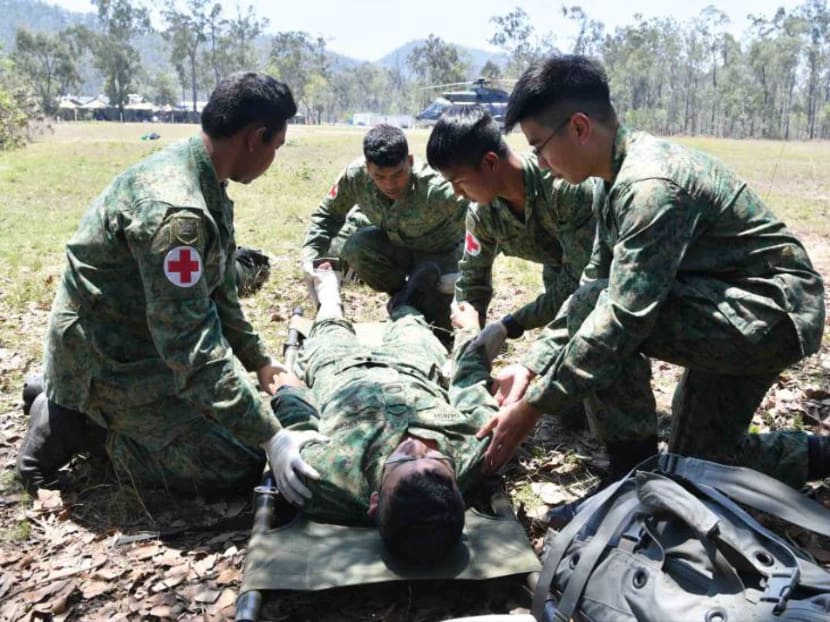SAF should step up training for medical officers in helicopter evacuation protocols: COI
SINGAPORE — The Singapore Armed Forces (SAF) should step up training in helicopter evacuation protocols and pre-hospital care for its military doctors.

A simulation of emergency drills during a military exercise overseas. The Committee of Inquiry that looked into the death of actor Aloysius Pang said that the SAF should consider familiarising medical officers with the Republic of Singapore Air Force’s helicopter evacuation protocols.
SINGAPORE — The Singapore Armed Forces (SAF) should step up training in helicopter evacuation protocols and pre-hospital care for its military doctors.
This was among the recommendations of the Committee of Inquiry (COI) that looked into the death of actor Aloysius Pang.
On Monday (May 6), Defence Minister Ng Eng Hen released the COI’s recommendations as he delivered a ministerial statement on Pang’s death in Parliament.
The five-member committee said that the SAF should consider familiarising medical officers with the Republic of Singapore Air Force’s helicopter evacuation protocols.
It should do this for military doctors in full-time National Service (NS) and in reservist duty who are deployed overseas and have to manage helicopter evacuations, the COI said.
The COI, chaired by a State Courts judge, added that operationally ready medical officers could also be given temporary registration as observers in emergency and surgical departments of hospitals to re-familiarise themselves with acute trauma care.
Mr Heng Chiang Gnee, who chairs the External Review Panel on SAF Safety, said in an interview on Monday that a medical officer who has been exposed to trauma care would “have better experience in handling the situation”.
The external panel oversees the conduct of safety and system reviews in the armed forces and Defence Ministry. Mr Heng is director of marine service provider MMA Offshore and was chairman of the Workplace Safety and Health Council from April 2016 to March last year.
“If they could be attached to accident and emergency departments where they would see more of such cases, it would be useful,” he said, adding that the doctors’ level of participation will be subject to where they are placed.
Pang, an armament technician from the 268th Battalion Singapore Artillery, died in January after he was seriously hurt in an accident during an artillery live-firing exercise in the Waiouru Training Area in New Zealand. He was on reservist duty.
The 28-year-old was crushed between a lowered gun barrel and the cabin of the howitzer that he was called in to repair. The howitzer is an artillery gun mounted on an armoured chassis.
His death stunned the nation and sparked an outpouring of grief from colleagues, fans and the public.
Dr Ng said on Monday that the COI concluded that safety lapses by all three servicemen in the howitzer at the time — including Pang, who was not in a safe position before the barrel was lowered — had led to his death.
There was no evidence that foul play or deliberate acts had led to his death, Dr Ng said.
The accident happened on Jan 19 at about 2.05pm Singapore time. Pang was transferred to a battalion casualty station and the Waiouru Camp medical centre.
He was later evacuated by helicopter to the Waikato Hospital, a regional trauma centre in Hamilton, New Zealand, at 4.50pm. He arrived there at 6pm, nearly four hours after the accident.
Pang died four days later.
The COI found that the medical care given had been adequate but could be improved, given the “extenuating circumstances caused by the distance and the availability of the helicopter”, Dr Ng said, without elaborating.
Even so, the COI found that this did not cause or contribute to Pang’s death, Dr Ng added.
When asked what was lacking in the protocols and processes for helicopter evacuations, Mr Heng said that the helicopter attached to the exercise had belonged to a New Zealand company.
“What was planned for had to be changed because the helicopter was being used for another case. This was a third-party helicopter,” he added without disclosing the name of the company.
Responding to TODAY’s queries last month, a spokesperson for the Defence Ministry said that the mode of evacuation for injured soldiers is determined before overseas training begins, as part of the medical support plan.
In three quarters of the countries where outfield training happens, helicopter evacuation is carried out. In the remaining countries, casualties are evacuated by land as that is the “most expedient” option, said the ministry’s spokesperson.
Medical support plans for overseas training are customised for each training area, the spokesperson said. The factors considered include the host countries’ medical facilities, terrain and the transport equipment available, including emergency evacuation assets that are arranged with the host countries.
When a serviceman is hurt, a medical officer or medic will begin medical treatment on the scene.
After being stabilised, the serviceman will then be evacuated to the nearest medical facility with the appropriate level of care. The quickest modes of evacuation are by land or air, said the ministry’s spokesperson.
The COI that probed Pang’s death said that it may also be useful for the SAF to formalise arrangements with the receiving hospitals at an “appropriate level in the hospital administration”.
This will allow Singaporean doctors caring for injured soldiers overseas to stay abreast of clinical developments and contribute more effectively.
The COI also recommended that a guideline be drawn up to set out the protocols for hospitals overseas in managing the remains of servicemen in military exercises.
The Defence Ministry declined comment when asked about the gaps in the handling of Pang’s case that led the COI to make these recommendations.
Meanwhile, Dr Ng said that the SAF has accepted the committee’s recommendations.
Military doctors will have to go through refresher training on helicopter evacuation processes before they are deployed to provide medical support overseas, he said.
The SAF will also explore initiatives to improve their exposure to acute trauma care. ADDITIONAL REPORTING BY LOW YOUJIN











